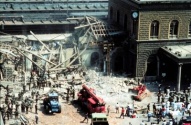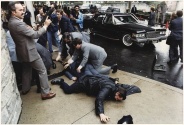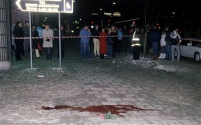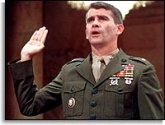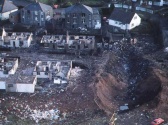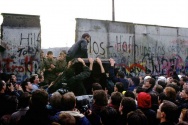1980s
| 1970s« | |
|---|---|
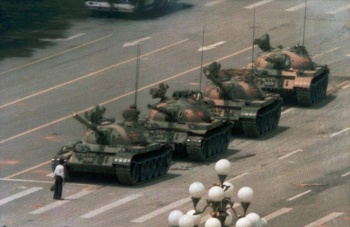 The still unidentified 'Tank Man' facing down a column of tanks Tiananmen Square on June 5, 1989 | |
| The 1980s saw an increase in the global organisation of capital, and a dramatic end to the coherence of the Soviet empire. |
The 1980s saw the effective end of the Cold War and associated nuclear arms race. It also saw the exposure of Operation Gladio, a NATO backed project which was revealed to have terrorized and murdered civilians in order to subvert the democratic process. Arms expenditures actually increased, as the MICC hyped the threat of international "terrorism".
“The Savings and Loan crisis was a huge wealth transfer... According to people like Houston Post's Pete Brewton It was intelligence and organized crime that essentially collaborated with major Wall St banks at the time like Drexel Burnham Lambert and some of these other groups. This particular nexus, by taking like 6 billion dollars out of the savings and loan industry when it was deregulated basically buy what they didn't already own of corporate America. And so you have the same group more or less having compromised politicians through sex blackmail for decades, and by the time they own corporate America, due to the role that corporate America plays in US politics they can essentially buy everyone else out... During the same period of time, this network was also basically finding a way to off-the-books finance, erm "activities" — secret wars, really — all over the globe, not just in Nicaragua, at the the time, but really congressional approval to finance proxy armies... and for a long time this was justified with "this is necessary to fight the communists" and of course with the fall of the Soviet Union that excuse sort of collapses. And from that point, I see that power nexus in the 80s, after the fall of the Soviet Union I see that there's two, really a split, and you see it with US politics today. You have people... hungry for a return to the Reagan era days where America is on top and use these same types of illegal activities to further US imperialism, with a sort of warped idea of American nationalism. And then you have this other side that's the internationalist camp or the globalists that want global governance, and you sort of have them competing but... both factions go back to Iran contra and these intelligence, organized crime groups.”
Whitney Webb (November 2022) [1]
Contents
Supranational deep state evolution
The 1980s was an important decade in the evolution of the supranational deep state, since is saw the end of the Cold War separation of the world into two camps, raising the hopes of a "peace dividend" and a less militarised world. "Terrorism", especially "Islamic terrorism" was promoted as an enemy image to help to reposition the MICC.
End of the Soviet Empire
The dissolution of the USSR lead to an end to the cold war. After brief talk of a 'peace dividend', the military industrial complex was to work though the 1990s, promoting the "war on terrorism" narrative prepared at the 1979 Jerusalem Conference on International Terrorism. A 1984 conference in Washington had assisted in the global implementation of this plan.
Privatisation
- Full article: Privatisation
- Full article: Privatisation
The 1980s was an important decade for the economic project of privatising public organisations. Ronald Reagan as US President and Margaret Thatcher as UK Prime Minister were important figures in this regard.
Tianenman Square
Chinese students, inspired by the collapse of communist governments in Eastern Europe, tried to wrest control from the old communist leaders, massing in tens of thousands.
US deep state
- Full article: US deep state
- Full article: US deep state
By the 1980s, the CIA had over 30 years of experience at controlling the corporate media, and had a wealth of experience at using it. The Watergate Coup, for example, even today is generally dubbed the "Watergate Scandal", obscuring its true identity. Similarly, the name "Iran-Contra" omits any reference to the drug running component. What purported to be a congressional investigation was equally tightly controlled. Gorton suggests that it was a limited hangout designed to implicate Ronald Reagan. In any case, Bush's infamous claim to have been "out of the loop" went unquestioned by Cabal member Dick Cheney. Al Martin, the most senior Enterprise whistleblower, reports that when the upper echelons of The Cabal decided to wind up The Enterprise, they insulated themselves from exposure by killing hundreds of mid-level group members.
The Enterprise
- Full article:
 The Enterprise
The Enterprise
- Full article:
After the October Surprise Conspiracy thwarted Jimmy Carter's aspirations for a second term, George H. W. Bush, leader of "the enterprise" became US Vice President in January 1981. He then, as Mark Gorton describeds in Fifty Years of the Deep State, "embarked on a massive criminal romp.”[2]
Exposure
Le Cercle received its first serious exposure in 1982 when Hans Langemann, a BND officer leaked the Langemann Papers. The first published internal documents of the group, which had been active since the early 1950s, revealed that the group were promoting right wing governments across Europe.
Exposure of Operation Gladio
- Full article:
 Operation Gladio
Operation Gladio
- Full article:
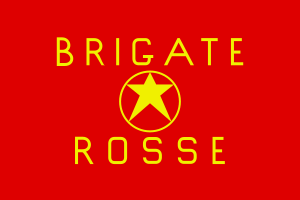
Operation Gladio killed European civilians throughout the 1980s, with false flag attacks such as the 1980 Bologna massacre. This lead to the exposure of Operation Gladio in Italy.
Related Quotations
| Page | Quote | Author | Date |
|---|---|---|---|
| Le Cercle | “an international coalition of right-wing intelligence veterans, propaganda assets and top politicians who would shape the 1970s and 1980s.” | David Teacher | 2008 |
| Manuel Noriega | “He was a pawn in an international game that was way bigger than him and he certainly paid dearly," said Barbara Trent, a filmmaker who directed "The Panama Deception," a 1992 documentary about the U.S. invasion.
"He was a small-time player catapulted to international fame by the U.S. government and the media to drum up support for a ruthless invasion," Trent added. Working with the CIA Noriega ruled Panama from 1983 to 1989. Before and during that time, he worked with multiple U.S. intelligence agencies who agreed to ignore allegations that he was a drug trafficker in exchange for a staunch anti-communist ally in Central America during the height of the Cold War. Noriega was paid handsomely for his help, about $10,000 per month at one point, according to John Dinges, author of "Our Man in Panama: How General Noriega Used the United States and Made Millions in Drugs and Arms (1990)." "The relationship with the CIA and the Pentagon was quite intense in the early '80s," Dinges told ABC News. "He was considered an important asset, and everyone in the documents I've read spoke very highly of him. He was trusted to the extent that you trust someone who is a paid intelligence asset.” | Manuel Noriega ABC News Kaelyn Forde | 2017 |
